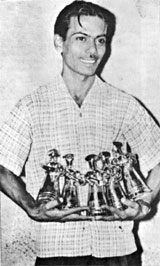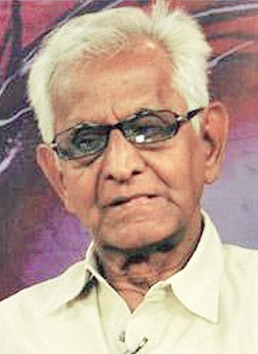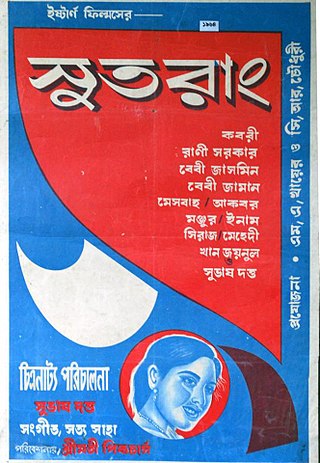
Tanvir Mokammel is a Bangladeshi filmmaker and writer. He is the recipient of Ekushey Padak in 2017. He won Bangladesh National Film Awards total ten times for the films Nodir Naam Modhumoti (1995), Chitra Nodir Pare (1999) and Lalsalu (2001). He is the current director of Bangladesh Film Institute in Dhaka.

Mohammad Zahirullah, known as Zahir Raihan, was a Bangladeshi novelist, writer and filmmaker. He is most notable for his documentary Stop Genocide (1971), made during the Bangladesh Liberation War. He was posthumously awarded Ekushey Padak in 1977 and Independence Day Award in 1992 by the Government of Bangladesh.

The Bengali-language film industry based in Dhaka, Bangladesh, has been significant since the early 1970s. It is better known by the popular term Dhallywood, which is a portmanteau of "Dhaka" and "Hollywood". The dominant style of Bangladeshi cinema is melodramatic cinema, which developed from 1947 to 1990 and characterizes most films to this day. Cinema was introduced in Bangladesh in 1898 by the Bradford Bioscope Company, credited to have arranged the first film release in Bangladesh. Between 1913 and 1914, the first production company, Picture House, was opened. A 1928 short silent film titled Sukumari was the first Bengali-produced film in the region. The first full-length film, The Last Kiss, was released in 1931.

Morshedul Islam is a Bangladeshi film director. His notable films include Agami (1984), Chaka (1993), Dipu Number Two (1996), Dukhai (1997), Khelaghor (2006), Durotto (2006) and Amar Bondhu Rashed (2011).

Matir Pahar is a 1959 Bengali film. The film was directed by Mohiuddin Ahmad. This was the third film made in East Pakistan.
Dhaka International Film Festival is a biennial film festival held in Dhaka, Bangladesh. Established in 1992, the festival was initially organized on annual basis, but became a biennial event since 1995.

Rawshan Jamil was a Bangladeshi actress and dancer. She was awarded Ekushey Padak in the dance category in 1995 and Bangladesh National Film Award for Best Supporting Actress for her role in the film Noyonmoni (1976).
Kittonkhola is a 2000 Bangladeshi film directed by Abu Sayeed. The story is based on the stage play Kittonkhola by Selim Al Deen. It stars Raisul Islam Asad, Mamunur Rashid, Pijus Bandapadhyay, Jayanta Chattopadhyay, Naila Azad Nupur, Tamalika Karmakar, Azad Abul Kalam, Kamal Ahmed and Habibur Rahman Habib.
The 24th Bangladesh National Film Awards, presented by Ministry of Information, Bangladesh to felicitate the best of Bangladeshi Cinema released in the year 1999. The National Film Awards are the only film awards given by the government itself. Every year, a national panel appointed by the government selects the winning entry, and the award ceremony is held in Dhaka. The ceremony took place at Osmany Memorial Hall, Dhaka and awards were distributed by former prime minister Khaleda Zia. Additionally, Information Minister Tariqul Islam attended the function as the special guest at that evening.
Megher Onek Rong is a Bangladeshi Bengali film directed by Harunur Rashid based on Bangladesh Liberation war. This film got National Film Awards in five categories including Best Film, Best Director, Best Child Artist, Best Music Director, and Best Cinematography.

Surja Dighal Bari is a 1979 Bangladeshi feature film directed and produced by Sheikh Niamat Ali and Masihuddin Shaker. The screenplay was based on Abu Ishaque's 1955 novel of the same title. It was the first film made from the Government of Bangladesh grant. The film was first released in a theater in Natore.
Sadek Khan was a Bangladeshi journalist, columnist and filmmaker. In 2002, he was awarded Ekushey Padak by the Government of Bangladesh.

Nazmul Huda Bachchu was a Bangladeshi film and television actor. He won Bangladesh National Film Award.

Sutorang is a 1964 Bengali-language film directed by Subhash Dutta. Dutta played the male lead role as well. Actress Kabori Sarwar made her debut in this film. The film won the second prize in Frankfurt Asia Film in 1964.

Kancher Deyal is a 1963 Bengali-language Pakistani film. It was written and directed by Zahir Raihan. Anwar Hossain, Sumita Devi, Khan Ataur Rahman in the lead role and others supporting role were portrayed in the film.
Uttam Guho is a Bangladeshi art director of films and stage plays. He won Bangladesh National Film Award for Best Art Direction a record 10 times for the films Anya Jibon (1995), Chitra Nodir Pare (1999), Hason Raja (2002), Lalon (2004), Raja Surja Khan (2012), Mrittika Maya (2013), Shankhachil (2016), Gohin Baluchor (2017), Ekti Cinemar Golpo (2018) and Gor (2020).
Ahmed Muztaba Zamal is a Bangladeshi film critic. He is the editor of Celluloid, a quarterly film magazine, and is the director of the Dhaka International Film Festival.
Elora Gahar is a Bangladeshi film and television actress. She won Bangladesh National Film Award for Best Child Artist for the film Surja Dighal Bari (1979).
Sajib is a Bangladeshi film and television actor. He shared the Bangladesh National Film Award for Best Child Artist for the film Surja Dighal Bari (1979) with Elora Gohor.
Masihuddin Shaker is a Bangladeshi film director and writer. In 1979, he won the Bangladesh National Film Award for Best Director for the film Surja Dighal Bari.










